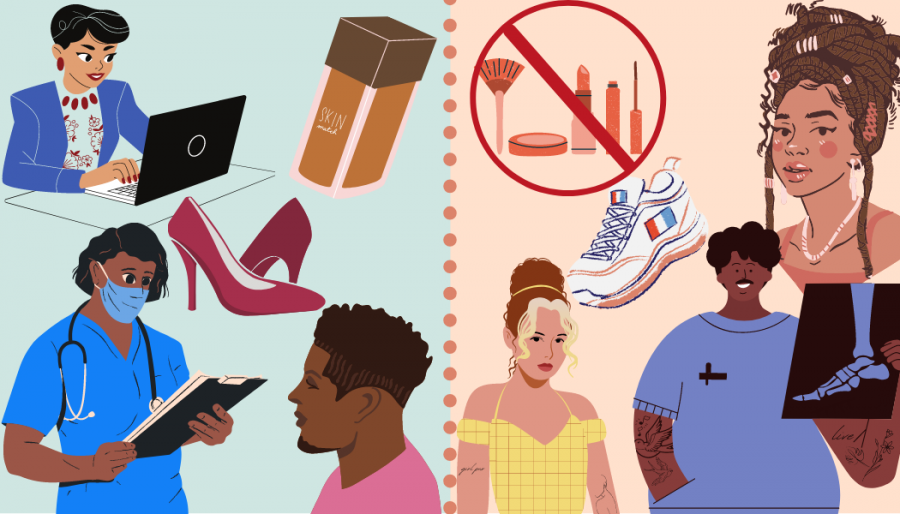“I may be a bit biased, but I don’t see a problem with a doctor being “tatted up” or a teacher with pink hair because it doesn’t affect the way they do their jobs.”
I never understood the importance of certain professionalism principles.
Who decided the rules for how one should look and dress at work to be taken seriously? As a young adult born in an expressive, open generation, it’s hard to accept the traditional workplace etiquette.
It’s time to let go of outdated expectations in workspaces, especially as a new wave of individuals from Generation Z enter.
Visible tattoos are growing in popularity and need to be normalized.
Tattoos are inherently art, but instead of a canvas bearing the image on a wall, it’s on a body. For many cultures, tattoos aren’t just art, they’re representations of lineage and hold traditional value as seen with Polynesian peoples who used tatted symbolism for spiritual and tribal purposes.
Society holds a stigma against tattoos and associates them with lower-class individuals, criminals or drug addicts. This stigma influences employers who unjustly discriminate against those with body art before getting to know them as individuals.
Similar to tattoos, piercings have history and meaning, so seeing them in a work environment shouldn’t cause heads to turn.
In parts of the Middle East, African women’s nose piercings signify marriage, financial security and wealth much like wedding rings in Western culture. This practice is rooted in ancient times with its most notable mention in the Bible (Genesis 24:22) when Isaac adorned his new wife with a nose ring.
As for Indian culture, a pierced nose carries a religious undertone, specifically for those practicing Hindu. At a young age, Hindu girls pierce their nose “upon physical maturity as an indication that she is now eligible for marriage. It is also a way in which the elders of the household bestow worldly goods… on the young girl as their daughters are Luxmi (Goddess of Prosperity) and lights of the homes,” according to Admin M. Mantra in Medium.
Other visible piercings such as lips and ears also have cultural significance similar to tattoos, but for the sake of brevity, the history lesson will end.
So, if piercings carry history (and look stylish while doing so), why deny individuals from embodying their culture? Or shun individuals who just want a nose ring?
There are specific professional fields that are exceptions to this argument, the obvious one being the medical field for sanitary and safety purposes.
Aside from body modification, business attire is another issue that needs reprimanding, especially for men.
Women have many ways to make “comfy” outfits look presentable such as skirts and dresses, but all men have are suits and ties, which isn’t ideal on hot days.
After Googling men’s attire for summertime, I wasn’t shocked to see the limited options they have compared to women. Everyone can agree that wearing full-length pants in the summer heat is exhausting. Looking presentable is one thing but dressing up in business attire every day to work a 9-to-5 is unnecessary.
Alongside having more acceptable options when discussing comfortable clothing is hairstyles: specifically colored hair and African hair.
Starting with the latter, there have been unwarranted complaints about African hairstyles in professional settings. Even after the Crown Act — prohibiting race-based hair discrimination — was passed in various states, comments from corporate America continue condemning Black employees.
It’s mind-boggling that a “messy bun,” often worn by individuals with straight hair, can pass as “professional” but culturally-based hairstyles such as braids, afros and kinky curls fail the test.
In addition to hairstyles, unnatural hair color shouldn’t deem someone unprofessional. There isn’t any scientific study linking hair color to someone’s performance at work, so why is it frowned upon?
Lastly, makeup shouldn’t be expected to be worn by women.
Some women feel more comfortable in their skin without makeup and shouldn’t be questioned if they decide to go natural to work. If someone’s natural appearance needs to be altered in order to be “professional,” then there are bigger problems that need to be addressed in society.
Change is a necessary component to progress and needs to be applied to professional norms. I may be a bit biased, but I don’t see a problem with a doctor being “tatted up” or a teacher with pink hair because it doesn’t affect the way they do their jobs. This mindset needs to be adopted moving forward seeing that this new generation writes its own rules.
Aaliyah Alexander is a junior studying journalism and international studies. Follow her on Twitter @aaliyahdanyell.












